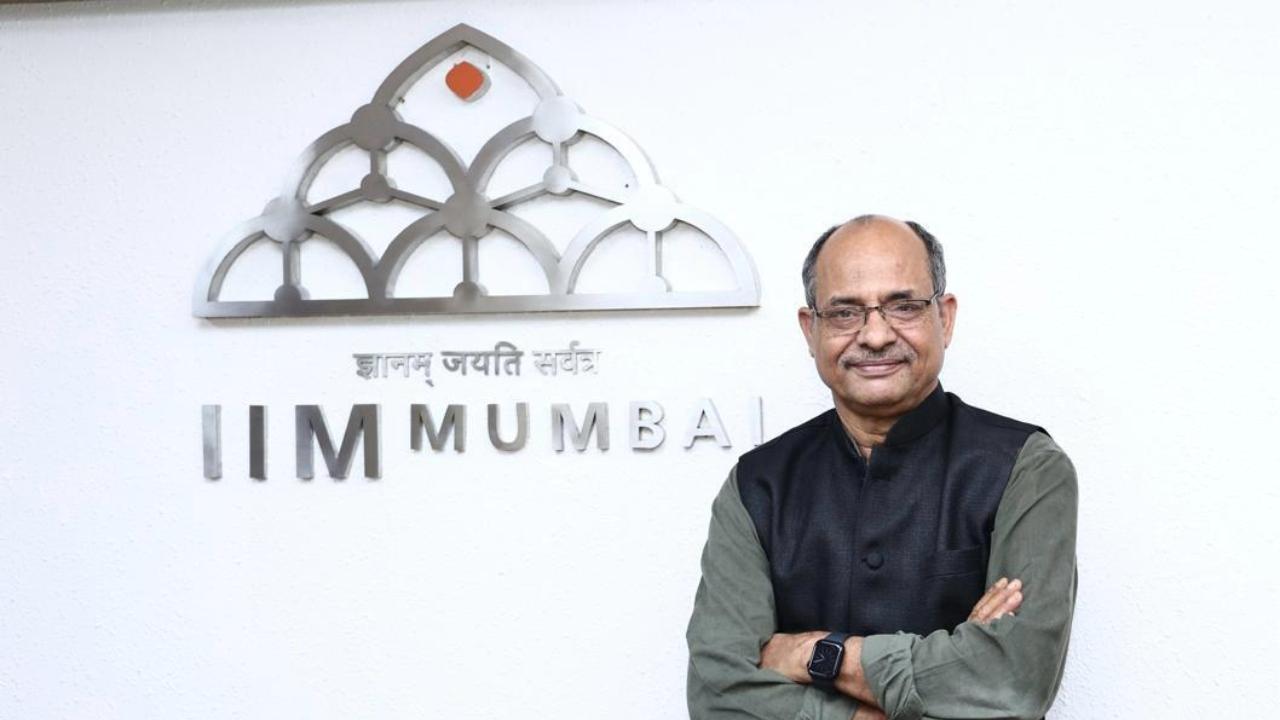Designated by the Ministry of Education as the nodal hub for logistics and supply chain under the National Education Policy (NEP), IIM Mumbai has been tasked with capacity-building to promote the PM Gati Shakti Master Plan
IIM Mumbai Director Professor Manoj Tiwari
In alignment with the government’s ambitious push for multi-modal logistics, IIM Mumbai (formerly NITIE) is moving into mission mode to meet the sector’s growing need for skilled manpower. Over the next five years, an estimated 1.15 crore professionals will be required in logistics.
To address this demand, the institute is introducing specialised courses aligned with industry needs and emerging technologies.
Designated by the Ministry of Education as the nodal hub for logistics and supply chain under the National Education Policy (NEP), IIM Mumbai has been tasked with capacity-building to promote the PM Gati Shakti Master Plan. To further this initiative, IIM Mumbai established the Centre of Excellence in Logistics and Supply Chain Management and the Center for Innovation Incubation & Entrepreneurship. The institute will also manage a portal, collaborating with other participating institutes offering courses on this platform.
A few months ago, IIM Mumbai submitted a report titled “Future Talent Requirements in Logistics, a Vision 2047” to the Union Ministry of Education. Authored by a panel of experts including Ashish Chauhan (CEO and MD, NSE), Prof. S. G. Deshmukh (IIT Delhi), Prof. Gitakrishnan Ramadurai (IIT Madras), Peeyush Gupta (Tata Steel), Ketan Kulkarni (Allcargo Logistics), Neelesh Mundra (McKinsey), and Prof. Manoj Kumar Tiwari (Director, IIM Mumbai; Convenor), the report highlights the need to revise existing curricula. It emphasizes incorporating emerging technologies, data analytics, sustainability, and problem-solving to keep pace with changing industry dynamics.
A key driver behind this transformation is the rapid adoption of technologies such as Big Data Analytics, Digital Twin, Blockchain, Cloud Logistics, IoT, Transportation Management Systems (TMS), self-driving vehicles, AR/VR, real-time supply chain visibility, robotics, warehouse automation, and drones. Government initiatives, such as developing 35 multi-modal logistics parks and 108 port connectivity projects, underscore India’s strong focus on advancing logistics infrastructure.
Elaborating on the new courses, Professor Manoj Tiwari, Director of IIM Mumbai, noted that the institute is currently offering 14 PM Gati Shakti courses covering areas like data analytics in logistics, healthcare and inventory, and warehouse automation. In addition, IIM Mumbai has designed indicative courses that other participating institutes may reference, though each institute may also create its own programs tailored to PM Gati Shakti’s requirements.
Professor Tiwari said that 2.25 crore people are currently engaged in logistics across various sectors, yet an additional 1.15 crore is needed by 2030. “We are on a mission to train people and bridge the gap between industry demand and skilled manpower,” Tiwari said. “We are fast-tracking these efforts by developing industry-customized courses to fulfil the government’s capacity-building mandate and ensure a steady stream of trained professionals.”
To widen access, IIM Mumbai is also offering logistics-related courses on digital platforms such as SWAYAM and SWAYAM Plus (Massive Open Online Courses). Seven new courses have already been launched, covering AI/ML in port management, warehouse automation, supply chain digitization, the role of blockchain, e-commerce supply chains, cybersecurity in supply chains, and digital innovation and technology in supply chains.
“In order to keep our faculty up to date,” Tiwari added, “we encourage them to continually upgrade their knowledge. They study best practices, conduct industry case studies, and visit ports, warehouses, and other industry setups. This helps ensure that our courses stay relevant and reflect the latest technological trends.”
Recommendations on Curriculum
Given the significant workforce demands in the logistics sector, as well as ongoing technological advancements and future industry needs, there is a pressing need to revise curricula to integrate hands-on learning and real-world case studies. Specifically, it is recommended that institutions introduce an “Introduction to Logistics and Supply Chain” course for all first-year engineering students, thereby ensuring a foundational understanding of key logistics and transportation components.
To align with the evolving requirements of the manufacturing, logistics, and supply chain management industries, educational institutions can develop specialized curricula at various levels.
Foundational Courses:
- Supply Chain Management Fundamentals
- Logistics Management
Advanced Courses:
- Programming With AI for Problem Solving
- Design Thinking With AI
- Operations Research
- Supply Chain Analytics
- Global Procurement & Supply Management
- Supply Chain Finance
In order to prepare students for the increasing demands of digitalization, institutions can also offer 15-hour or 30-hour certification programs, online courses via SWAYAM and NPTEL, and video lectures covering a broad range of topics such as — Multimodal Logistics, Road Transport, Rail Freight Transport, Maritime Transport, Air Cargo Shipment E-Commerce and Q-Commerce, Omnichannel Commerce, Reverse Logistics, Return Management Healthcare Logistics, Agri-Food Supply Chain, Cold Supply Chain, Emergency Supply Chain Management, Metal and Mineral Supply Chain, Oil and Gas Supply Chain, Semiconductor Supply Chain, Warehouse Automation, Automotive and Household Sectors, Supply Chain for the Energy Sector, Space Industry Supply Chain, Nuclear Power Plant Supply Chain, Military Logistics, Spare Parts Supply Chain, Generative AI, Big Data Analytics, Cloud Computing, Quantum Computing, Internet of Things, 6G Technology, Geo-Spatial Technologies, Digital Twin, AR/VR, Control Tower, Robotics, Autonomous Vehicles, Drones,SDGs in Supply Chain Management, Clean Technology, Carbon Footprint, Water Footprint, 3D Printing.
“While several institutions have introduced logistics courses in response to various Ministry of Education initiatives, these efforts remain largely uncoordinated. A more streamlined and cohesive approach to curriculum development will ensure a highly skilled workforce ready to meet future logistics challenges and reinforce India’s growing leadership in the sector,” the report submitted by IIM Mumbai states.
“Exciting news! Mid-day is now on WhatsApp Channels Subscribe today by clicking the link and stay updated with the latest news!” Click here!
